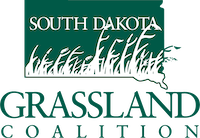In March of 2023, the Grassland Coalition put on a series of four Grazing School Workshops across the state of South Dakota. The goal for these workshops was to help producers work through any questions or challenges they had with managed grazing. Participants brought their concerns to the group for discussion, and those concerns were then addressed by local ranchers and agency personnel. The following are some of the grazing management concerns people brought to the workshops and answers from the ranchers and agency staff:
Question: I subdivided 640 acre pastures to 160 acres. My goal is to leave 1200 #/acre. However, within each quarter there are over grazed patches and patches with knee high grass. What is causing this?
Answer: Decreasing paddock size will reduce patch grazing. As paddock size and pounds of livestock per acre increases, cattle become less selective. Less palatable plants will be consumed along with the more palatable plants. The result will be more pounds of forage consumed per acre.
Question: My cows are not eating invasive plants like thistle and leafy spurge. Will they eat these plants if I decrease the paddock size?
Answer: If the paddock size, herd size, amount of forage remaining after grazing and recovery are planned properly, cattle will eat many invasive forbs. Expect control, not eradication.
Question: My 1000 acre paddocks are a “gather and move” operation during the rotation. If I subdivide these pastures enough, will the moves become easier?
Answer: Yes. Cattle learn to expect new fresh forage when you arrive to move them. The smaller the pasture the easier it is for the cattle to figure this out and make your job easier.
Question: Will grazing intensively help during the next drought?
Answer: Yes. Proper grazing planning will increase soil organic matter. For every one percent increase in organic matter the soil will hold one more inch of rainwater. Plant photosynthesis and respiration are wonderful gifts land managers can learn to take advantage of. Healthy soil is much more drought tolerant than unhealthy soil.
Question: My pastures are predominantly Brome grass, Thistles and Wormwood. What will intensive grazing do for my pastures?
Answer: Thistles and Wormwood in a Brome Grass pasture are often a result of season long grazing resulting in unhealthy soil. Short duration grazing will improve the soil health. Native grasses thrive in a healthy soil environment and will out compete most invasive species.
Question: Does intensive grazing work on native prairie?
Answer: Yes. Over time, soil health will increase. Native plant communities will become more diverse. Native plants that disappeared during season long grazing management will return under short duration grazing management.
Question: Cactus is a problem on my west river pastures. Will intensive grazing make cactus go away?
Answer: Under even a simple pasture rotation cactus will be reduced significantly. As the soil becomes healthier it will hold more water for longer periods of time. Cactus is vulnerable to molds and root competition from vigorous neighboring plants. Expect cactus to decrease significantly in a pasture rotation.
Question: I have 4 herds of cattle on my ranch. Will combining herds help my pastures?
Answer: Combining herds from 4 herds to one, in a pasture rotation allows for longer recovery of plants being grazed. This can result in higher plant populations and healthier soil, leading eventually to a higher stocking rate.
If you have questions of your own or would like to learn more about managed grazing, check out our Grazing Schools. The Grazing Schools are designed to help land managers implement improved grazing planning. Each 3-day school is led by experienced land managers and agency professionals. Find out more on the Grazing Schools HERE.
Questions and answers provided by Dan Rasmussen. Dan is a third-generation cattle rancher living in south central South Dakota. Dan served on the South Dakota Grassland Coalition Board for 18 years and currently manages the Grazing School Follow-Up Range Consulting Program for the Coalition.
